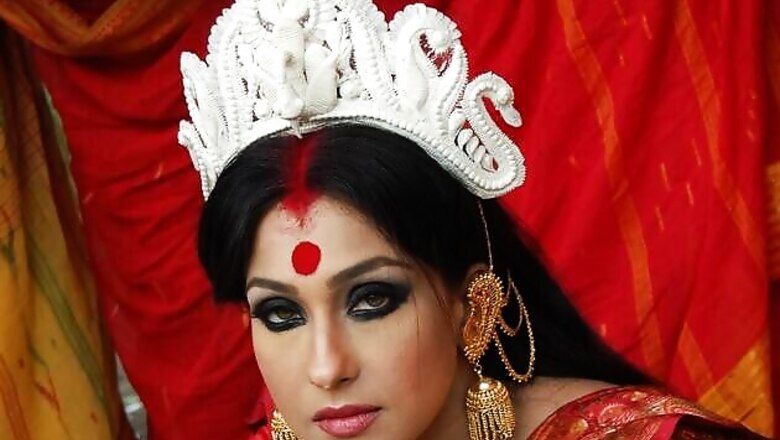
views
The city today is a greater unifier of people through one emotion – fear. This is the bottom line of Suman Mukhopadhyay's new film Mahanagar@Kolkata. The director structures a blend of the narrative and the anti-narrative out of the three stories.
Ek Tukro Nyloner Dori (A Piece of Nylon Rope), Amar Kono Bhoy Nei Toh (I have nothing to fear, do I?) and Angshik Chandragrahan (Partial Lunar Eclipse) are based on the constant fear people of the modern metropolis (Mahanagar) Kolkata live in, live with and live within.
Whether it is Rohit (Chandan Roy Sanyal of Kaminey fame), the USA-returned MBA drowning his fear in suicidal depression; or, whether it is his beautiful, estranged wife Rongili (Rituparna Sengupta) dogged by the fear of a failed marriage and aborted motherhood, they stand united by fear.
Ek Tukro Nyloner Dori (A Piece of Nylon Rope) shows a temporary bond between two social disparates – Jagannath (Biplab Chatterjee), a clerk in a lowly office, and Manmatha (Anjan Dutt), a higher officer in another company. They meet in the waiting room of a horrifying public hospital in Kolkata with its compound filled with ruffians and anti-socials whispering abuses or knifing each other.
Jagannath is not afraid that his injured son will die because he carries a ‘lucky’ mascot – a piece of nylon rope – the remains of a hangman’s noose supposed to wash away all life’s tragedies. Manmatha does not have faith in nylon ropes. His depressed nephew Rohit comes home cured. Is he really cured? Or, does he escape one fear to step into another more fearful world – the world of the lonely and the deserted?
Amar Kono Bhoy Nei Toh? (I have nothing to fear, do I?) is the second segment the first merges into, turning the marginal Biren (Arun Mukhopadhyay) of the first story, a small tea-place owner in Manmatha’s government office into a atypical hero.
Thrown out of the government office, tea table, kettle, stove, cups and all, Biren, who lives in a ramshackle slum threatened by high rises in the neighbourhood, wanders the bylanes to pick up leftovers from the vegetable vendor, the corner tea-shop, the chicken stall for free.
A minor bomb blast in a site under construction fills him with the fear of a sudden and violent death. “I have nothing to fear, do I?” he keeps asking all and sundry, till they shrug him off as a man who is losing his beans.
Selim, a young anti-social, pokes fun at him. He pulls a gun, forces the butt into Biren’s hand and asks him to pull the trigger. His friends warn him but he says the magazine is empty. It is not and the innocent Biren’s death is the result of a joke!
When the building contractor’s mafia don warns him that no magazine is ever empty, the frightened-out-of-his-wits Selim asks, “I have nothing to fear, do I?” turning his life into another cruel joke growing out of and ending in fear.
Angshik Chandragrahan (Partial Lunar Eclipse) harps on the dying relationship between Rohit and his intellectual but beautiful girlfriend Kamalini (Sreelekha Mitra) and his dead marriage to Rongili who reacts to Rohit’s cowardly response to her pregnancy by aborting her unborn baby.
“One of the two of us must die,” she keeps on saying and writing. To die or not do die, is the fear that defines her life together or separated from Rohit.
“Kinjal is your fear, and he is also my freedom,” she tells Rohit, hinting at her husband’s suspicions of an adulterous affair.
On the night of the partial lunar eclipse, Rohit has a strange, hallucinatory vision of Rongili being elaborately prepared by several women for a self-imposed Sati. The Sati dream scene is visually beautiful, in enactment, picturisation, orchestration, composition and choreography, but it does not quite belong to the post-modern perspective of the too western Rohit. He fits more into the image of the young man who loves watching himself in the raw in the mirror or sing out of tune on a badly strung guitar!
Amar Kono Bhoy Nei Toh? is mind-blowing and the best – with special commendation for Arun Mukhopadhyay as Biren. Ek Tukro Nyloner Dori essays the murky environs of a public hospital where people come to escape death, now having become a ball of fear that can invite death at any point and at any moment. Angshik Chandragrahan is the least convincing and the most confusing though the closure smoothens out the fissures.
The actors carry the cake and the cream. Rituparna speaks little but embellishes her performance with those subtleties of understatement she is famous for. Her final frame of leaning against the door jamb of the hospital corridor with her eyes filled with sadness is beautiful.
Chandan Roy Sanyal tries to add flesh and blood to Rohit but his screen image is all wrong. He does not look the character he portrays. Sreelekha livens up the scenario in her brilliant cameo. It is a pleasant surprise to discover a mannerism-stripped Biplab as Jagannath. Anjan Dutta simply reenacts himself for Manmatha.
Rupam Islam’s musical score and lyrics are culture-specific to the city of Kolkata. The editorial ‘bridges’ to smooth over from one segment to the next with the camera going haywire over the highways and main roads with speeding traffic, are jarring and repetitive.
That ‘Kolkata’ happens to be the subject of this ‘city’ is coincidental because this could be any metro city in today’s India. It could be a small town like Malegaon or a table-top runway like Mangalore’s killer strip, or a deadly place called Dantewada or Bhopal!
Critic: Shoma A Chatterji


















Comments
0 comment